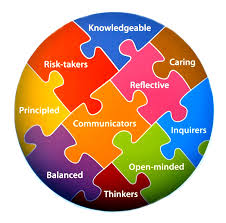Making the most of the International Baccalaureate at international schools
Why did you go into teaching? Was it to help students pass exams? I doubt it. Unfortunately, standardised testing and increasing pressure on teachers, students and school has led to teachers becoming overly focussed on exam results, therefore developing short term strategies to boost exam results. Two of the joys of teaching at international schools are the prospect of taking a new curriculum and having the freedom to teach the way you want to teach, developing the student in a much more holistic way.
More and more schools are turning towards the International Baccalaureate (IB) and with good reason too. This post will argue that adopting the IB learner profile in your own teaching, your students learning and in your life is one of the best ways to get the most out of the experience, taking your students beyond just academic success. Isn’t that what we went into teaching to do?!

The IB learner profile was developed to be a very core part in the way that IB schools operate. Unfortunately, some teachers moving from domestic teaching can be tempted to adopt the same approach to the IB and it can work in achieving positive exam results. However, those who try and adjust their teaching and approach to learning will see both them as teachers and their students flourish. Here are some ideas as to how you could implement it in your classroom or school:
- Put a large poster of the IB learner profile in your classroom.
- Have students stick it in their exercise book inset as a reminder
- Dedicate a month to each strand, maybe even using groups and having them rotate.
- Develop your own teaching and perhaps even life around the strands.
- Encourage your tutor/year group to evaluate themselves across the learner profile strands. Encourage them to focus on an area for improvement and then keep an electronic diary as to what they did related to that.
The following list may give you some ideas to get started with applying the IB learner profile. The IB learner profile aims to develop students (and teachers!) who are:
Inquirers
- Have students to produce a presentation on a topic drawn out of a hat in your tutor group time.
- Ask students to teach part of a lesson and present a lesson on a topic that hasn’t been covered yet – they could do it in groups.
- Develop a student’s interest in global news, outside of what is happening on their Facebook wall.
Knowledgeable
- Integrate Theory of Knowledge (TOK) into your lessons. It is so tempting to cast it aside but teachers who do embrace it will see students reap the rewards.
- Carry out initiatives to encourage reading.
- Learn about the local culture and history. Make sure you integrate local issues within your teaching – don’t just stick to case studies from your home country.
Thinkers
- Encourage students to ask the Why? Question. Teachers won’t always be able to answer it but either them or the student themselves can then go and find out.
- Build in subjects like Philosophy, Law, Theology and Psychology into your teaching: these are subjects that are not typically taught as stand alone subjects but will help develop deep thinkers.

Communicators
- Have students give a one minute sales pitch.
- Encourage students to participate in IMUN (Model United Nations) conferences
- Integrate debates within your lessons
- Have students carry out a social media marketing campaign for a school event.
- Try speaking to local staff only in their language for a week. Set a good example for your foreign students by making an effort to learn the local language yourself.
Principled
- Have students come up with a set of class rules and have them involved in implementing them.
- Encourage students to get their hands dirty on a local level by helping out at old people’s homes, homeless shelters, with recent migrants, environmental projects, etc.
- Give job titles out to students with scenarios where they’d need to think about their own personal gains versus those of the wider community.
- Have students evaluate their own carbon footprint, put it in perspective if everyone were to live like that and help them identify ways they can reduce their impact.

Open-minded
- Assign roles to students to discuss in the classroom where perspectives of the same issue may vary and will affect their local community.
- Ask students to take the Myers Briggs test, share the results with the class, explain how it affects and explains our differences in behaviour at times.
- Bring in different newspapers each morning – have students compare how different media sources have different perspectives.
Caring
- Encourage your school to have vertical tutor groups where the older students act as the role models for younger ones.
- Have older students run tutoring sessions for younger students.
- Have students run a project together: a charity fundraising and support initiative for example.

Risk-takers
- Encourage students to try a new writing style or approach solutions to problems in a different way to usual
- Have students attempt things they’d never think they’d be capable of doing: a 1 minute stand up comedy routine, carry out a major challenge such as a 30 km hike / half marathon
- Try experimenting with a new teaching strategy for a module: adopt a flipped classroom, take your students outside of the classroom to explore real life applications for example.
- Make the most of your weekends – try something new!
Balanced
- Have students assess how much time they spend on their mobile phones. Have a no mobile phones week and ask them to document what they’ve done during that time and reflect upon it.
- Set students challenges for the weekend, have them right a bucket list of the things they’d like do within the next two years.
- Get fully involved in your school’s IB Creativity, Activity, Service (CAS) programs. Being involved in extra-curricular activities is one of the most rewarding aspects of teaching at international schools.
Reflective
- Ask students to take Gallup’s strength finder test to assess their strengths and weaknesses. Set them targets to work on specific to their weaknesses and provide
- Carry out a daily self-evaluation of your own teaching.
- Carry out a 360 appraisal system within your department

If your school don’t offer the IB programs there is nothing to stop you using some of these ideas – they’ll be welcomed by your students and school leaders! The ideas above are just a starting point to get your creativity juices flowing. It may appear overwhelming but try a couple of them and persevere with them. Some will fail but some will enhance both yours and your students enjoyment of their education. Worst case scenario: you’ve ticked the box of being a risk-taker!
Talk to Teacher Horizons about your placement in an exciting location where you can use your skills to your full potential.




